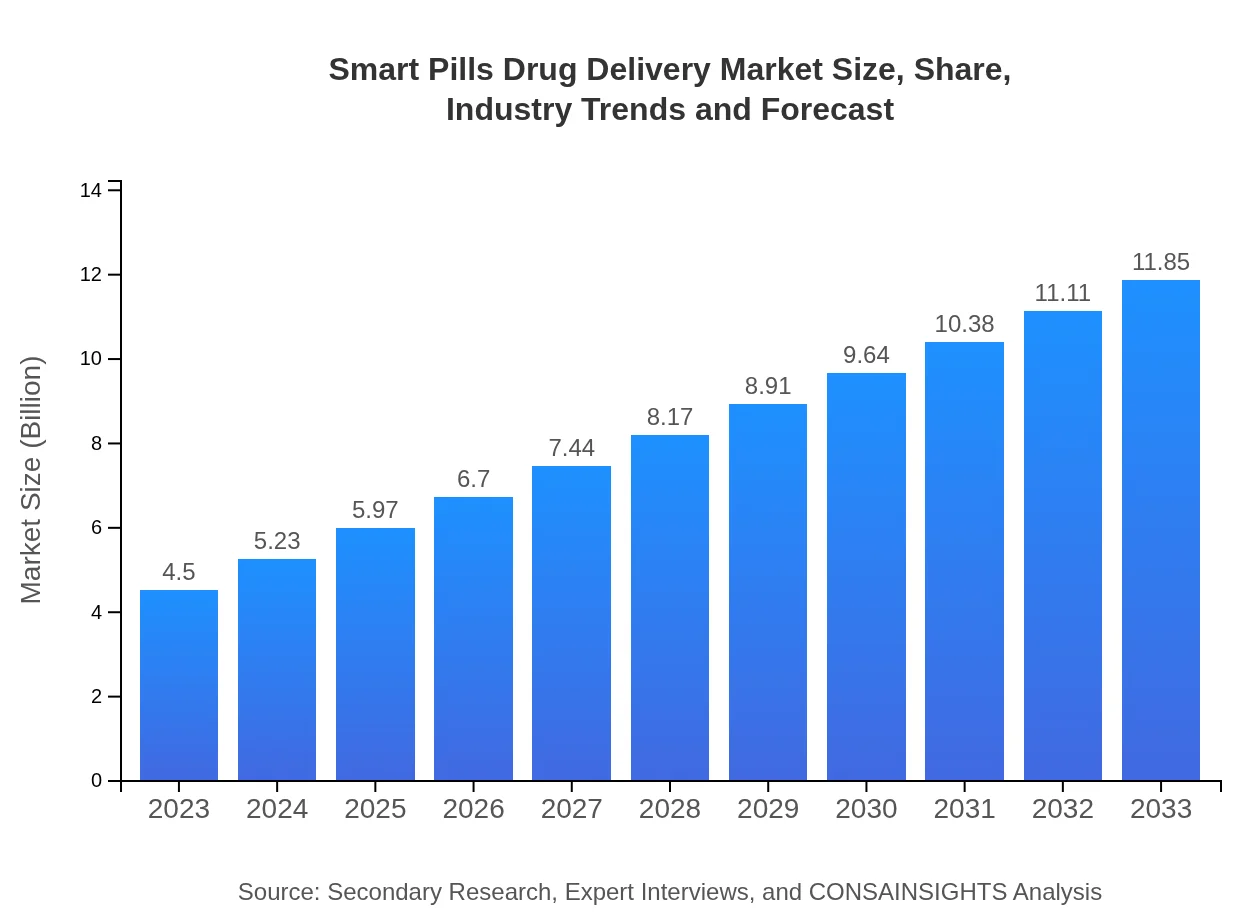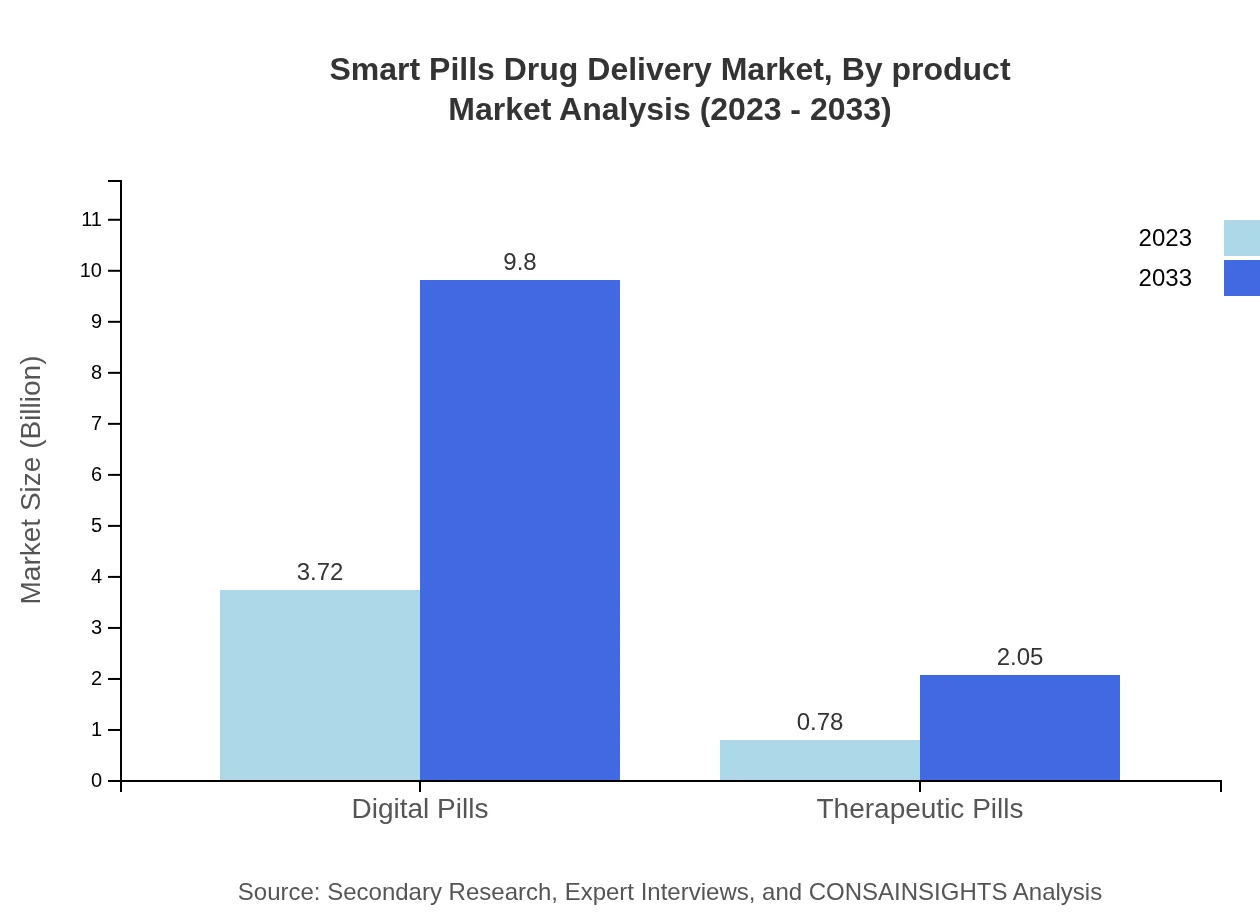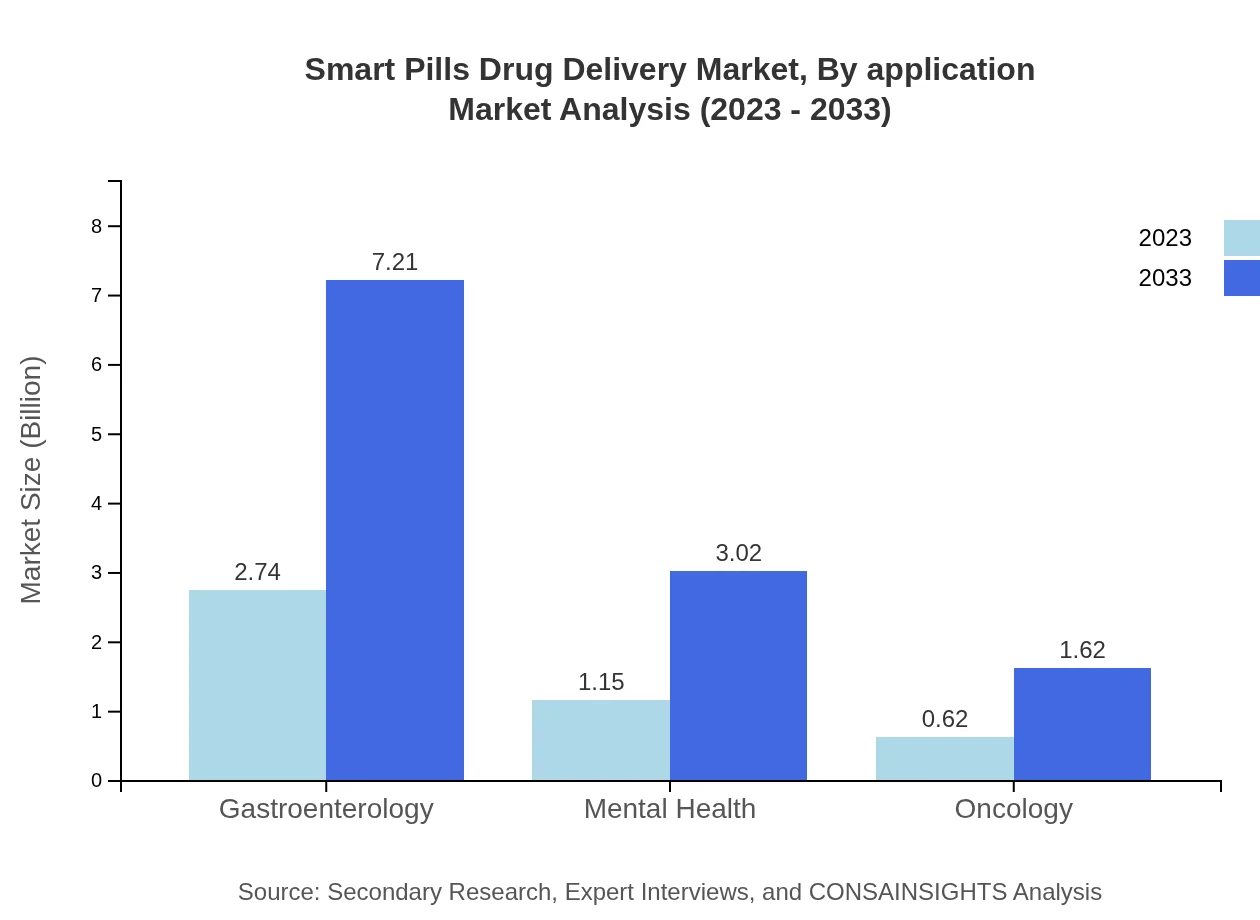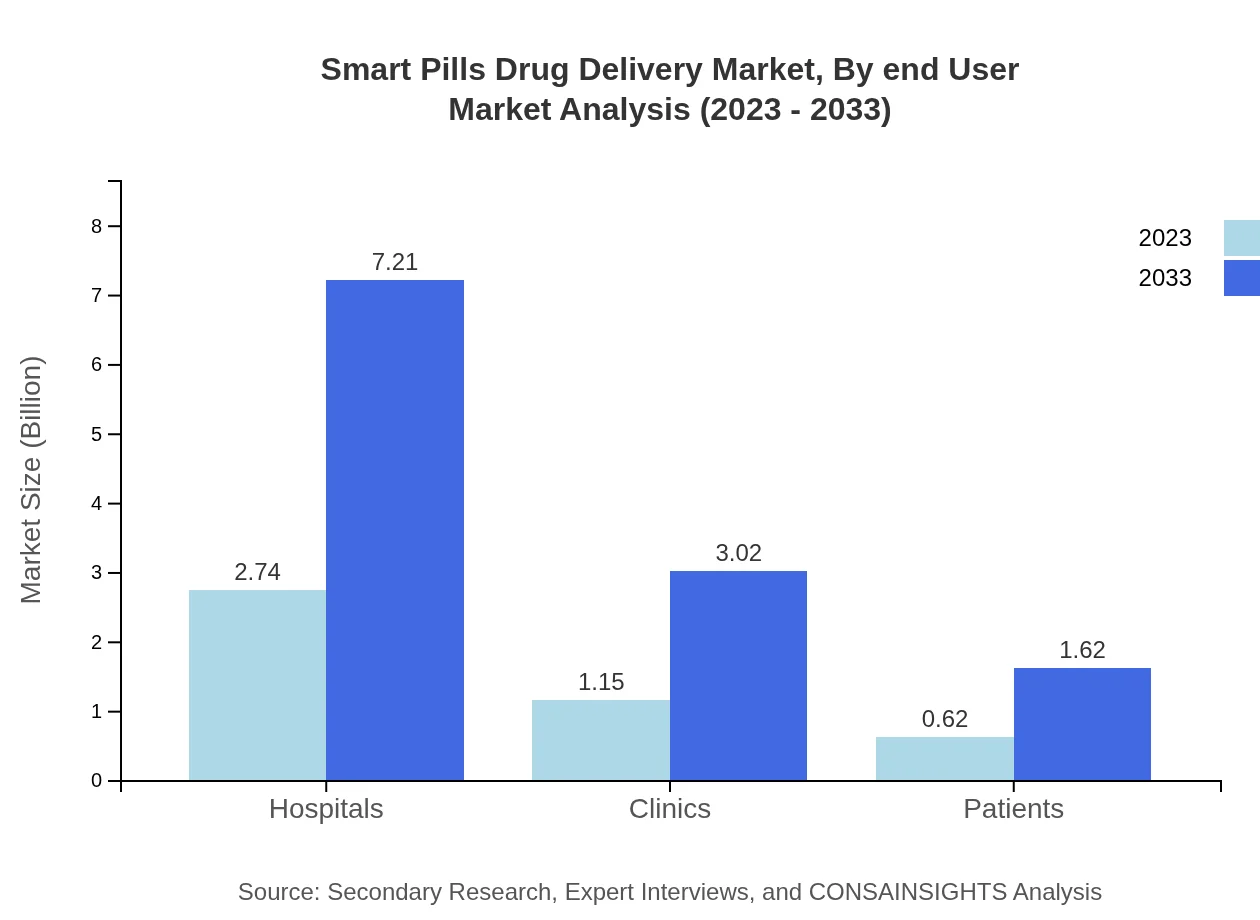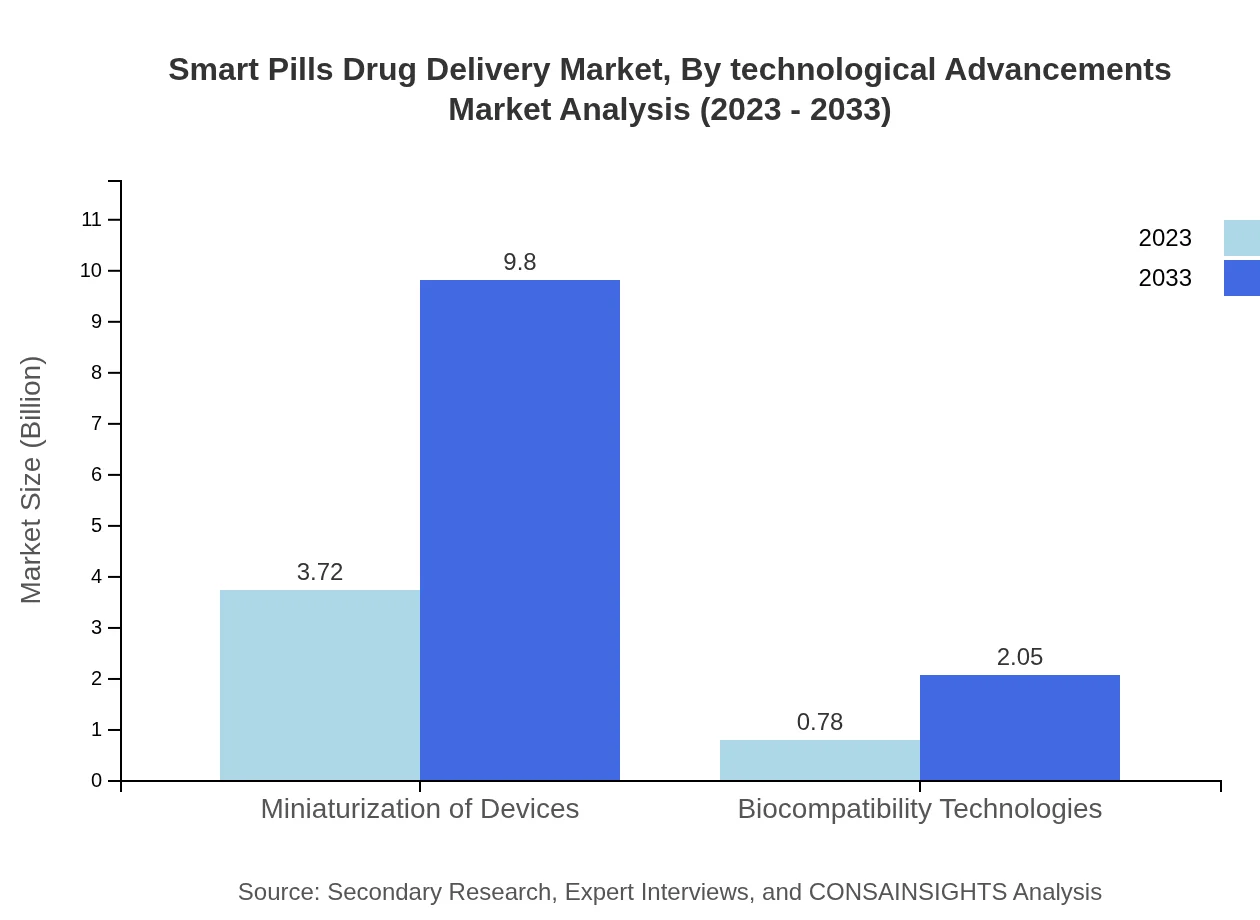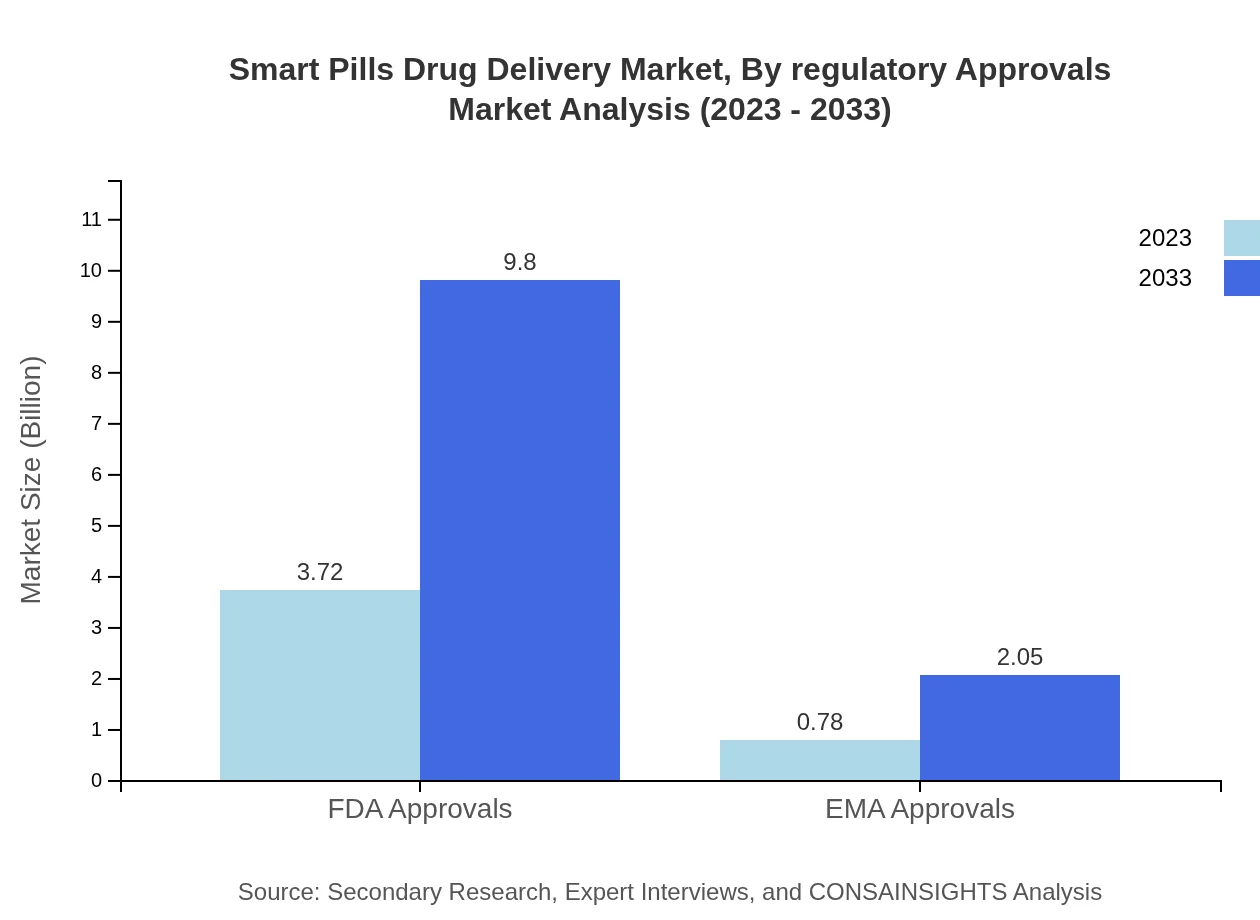Smart Pills Drug Delivery Market Report
Published Date: 31 January 2026 | Report Code: smart-pills-drug-delivery
Smart Pills Drug Delivery Market Size, Share, Industry Trends and Forecast to 2033
This report provides an in-depth analysis of the Smart Pills Drug Delivery market, highlighting trends, growth potential, regional insights, and competitive landscape, along with future forecasts from 2023 to 2033.
| Metric | Value |
|---|---|
| Study Period | 2023 - 2033 |
| 2023 Market Size | $4.50 Billion |
| CAGR (2023-2033) | 9.8% |
| 2033 Market Size | $11.85 Billion |
| Top Companies | Proteus Digital Health, Otsuka Pharmaceutical, Medtronic , Surescripts |
| Last Modified Date | 31 January 2026 |
Smart Pills Drug Delivery Market Overview
Customize Smart Pills Drug Delivery Market Report market research report
- ✔ Get in-depth analysis of Smart Pills Drug Delivery market size, growth, and forecasts.
- ✔ Understand Smart Pills Drug Delivery's regional dynamics and industry-specific trends.
- ✔ Identify potential applications, end-user demand, and growth segments in Smart Pills Drug Delivery
What is the Market Size & CAGR of Smart Pills Drug Delivery market in 2023?
Smart Pills Drug Delivery Industry Analysis
Smart Pills Drug Delivery Market Segmentation and Scope
Tell us your focus area and get a customized research report.
Smart Pills Drug Delivery Market Analysis Report by Region
Europe Smart Pills Drug Delivery Market Report:
The European market for Smart Pills Drug Delivery is predicted to flourish, expanding from USD 1.24 billion in 2023 to USD 3.27 billion by 2033. Strong government support, high healthcare spending, and a robust regulatory framework encourage investments in innovative health solutions, which is expected to propel market growth.Asia Pacific Smart Pills Drug Delivery Market Report:
The Asia Pacific region is poised for significant growth, projected to expand from USD 0.86 billion in 2023 to USD 2.27 billion by 2033. Factors such as rising healthcare expenditure, increasing incidence of chronic diseases, and advancements in technology contribute to this growth, particularly in countries like China and India, where there is an increased focus on digital health technologies.North America Smart Pills Drug Delivery Market Report:
North America is expected to dominate the Smart Pills Drug Delivery market, with a growth projection from USD 1.68 billion in 2023 to USD 4.43 billion by 2033. This growth is driven by an aging population, increasing prevalence of chronic diseases, and a high adoption rate of technology in healthcare solutions. The presence of leading market players and extensive R&D efforts also play a crucial role.South America Smart Pills Drug Delivery Market Report:
In South America, the Smart Pills Drug Delivery market is estimated to grow from USD 0.34 billion in 2023 to USD 0.90 billion by 2033. This region is characterized by an increasing emphasis on healthcare innovation, coupled with rising demand for advanced medical technologies. However, market growth may be hampered by regulatory challenges and varying levels of healthcare infrastructure.Middle East & Africa Smart Pills Drug Delivery Market Report:
The Middle East and Africa region's market is expected to grow from USD 0.37 billion in 2023 to USD 0.98 billion by 2033. Rising healthcare investments, increasing awareness about smart pill technologies, and expansion of healthcare infrastructure in emerging markets such as the UAE and South Africa will drive this growth.Tell us your focus area and get a customized research report.
Smart Pills Drug Delivery Market Analysis By Product
The product segmentation of the Smart Pills Drug Delivery market includes Digital Pills, which are projected to grow from USD 3.72 billion in 2023 to USD 9.80 billion by 2033, and Therapeutic Pills, with an expected rise from USD 0.78 billion in 2023 to USD 2.05 billion by 2033. Digital Pills hold a substantial market share, accounting for approximately 82.71% of the market in both 2023 and 2033 due to their effectiveness in improving patient adherence and their integration with mobile health platforms.
Smart Pills Drug Delivery Market Analysis By Application
Applications of Smart Pills include areas such as Gastroenterology and Mental Health. The Gastroenterology segment is leading with a market size increase from USD 2.74 billion in 2023 to USD 7.21 billion by 2033, reflecting the high demand for advanced diagnostic and therapeutic options within this field.
Smart Pills Drug Delivery Market Analysis By End User
The end-user segmentation highlights the importance of hospitals and clinics in the Smart Pills Drug Delivery market. Hospitals account for a dominant share, expanding from USD 2.74 billion in 2023 to USD 7.21 billion by 2033. Clinics are also projecting growth, increasing from USD 1.15 billion to USD 3.02 billion in the same period, showcasing an increasing reliance on smart technologies in various healthcare settings.
Smart Pills Drug Delivery Market Analysis By Technological Advancements
Technological advancements such as miniaturization of devices and biocompatibility technologies are crucial for the growth of the Smart Pills Drug Delivery market. Miniaturization is expected to increase from USD 3.72 billion to USD 9.80 billion from 2023 to 2033, playing a vital role in enhancing patient comfort and compliance, while biocompatibility technologies will also see substantial growth due to increasing regulatory focus on safety.
Smart Pills Drug Delivery Market Analysis By Regulatory Approvals
Regulatory approvals, specifically from the FDA and EMA, are critical in shaping the Smart Pills Drug Delivery landscape. The segment concerning FDA approvals is anticipated to grow from USD 3.72 billion in 2023 to USD 9.80 billion by 2033, reflecting a robust framework that fosters innovation and encourages competitive advancements in smart pill technology.
Smart Pills Drug Delivery Market Trends and Future Forecast
Tell us your focus area and get a customized research report.
Global Market Leaders and Top Companies in Smart Pills Drug Delivery Industry
Proteus Digital Health:
Proteus Digital Health specializes in the development of smart pill technologies that integrate sensors and software, allowing for real-time health monitoring and improved medication adherence.Otsuka Pharmaceutical:
Otsuka Pharmaceutical is known for its innovative digital pill solutions aimed at addressing therapeutic challenges in mental health, especially with their FDA-approved Abilify MyCite.Medtronic :
A major player in the global health technology market, Medtronic offers a range of smart drug delivery systems that enhance patient care and treatment adherence.Surescripts:
Surescripts provides technology solutions that streamline medication dispensing and enhance visibility within medication management systems, supporting better patient outcomes.We're grateful to work with incredible clients.









FAQs
What is the market size of Smart Pills Drug Delivery?
The Smart Pills Drug Delivery market is projected to reach a valuation of approximately $4.5 billion by 2033, reflecting a significant growth trajectory with a CAGR of 9.8% during the forecast period. This expansion signifies the increasing adoption of innovative drug delivery systems.
What are the key market players or companies in the Smart Pills Drug Delivery industry?
Key players in the Smart Pills Drug Delivery industry include pharmaceutical giants and specialized biotech firms engaged in the research and development of digital and therapeutic pills, enhancing market competition and driving innovation in drug delivery technologies.
What are the primary factors driving the growth in the Smart Pills Drug Delivery industry?
Growth in the Smart Pills Drug Delivery industry is primarily driven by technological advancements in miniaturization and biocompatibility, increasing prevalence of chronic diseases, and a rising emphasis on patient-centric healthcare solutions that enhance the efficiency of drug administration.
Which region is the fastest Growing in the Smart Pills Drug Delivery market?
North America stands out as the fastest-growing region in the Smart Pills Drug Delivery market, with projections indicating a rise from $1.68 billion in 2023 to $4.43 billion by 2033, primarily driven by robust healthcare infrastructure and increasing investments in innovative healthcare technologies.
Does ConsaInsights provide customized market report data for the Smart Pills Drug Delivery industry?
Yes, ConsaInsights offers tailored market report data for the Smart Pills Drug Delivery industry, allowing clients to gain insights specific to their needs, including segmentation analyses, geographic trends, and competitive assessments to support strategic decision-making.
What deliverables can I expect from this Smart Pills Drug Delivery market research project?
From the Smart Pills Drug Delivery market research project, you can expect detailed reports encompassing market size, growth forecasts, competitive landscape analysis, segmentation details, and regional insights that will provide a comprehensive understanding of the market dynamics at play.
What are the market trends of Smart Pills Drug Delivery?
Key market trends in Smart Pills Drug Delivery include a surge in digital pill adoption, expanded FDA and EMA approvals for such technologies, and a growing focus on minimizing the size of delivery devices, enhancing their usability and acceptance within the healthcare sector.

